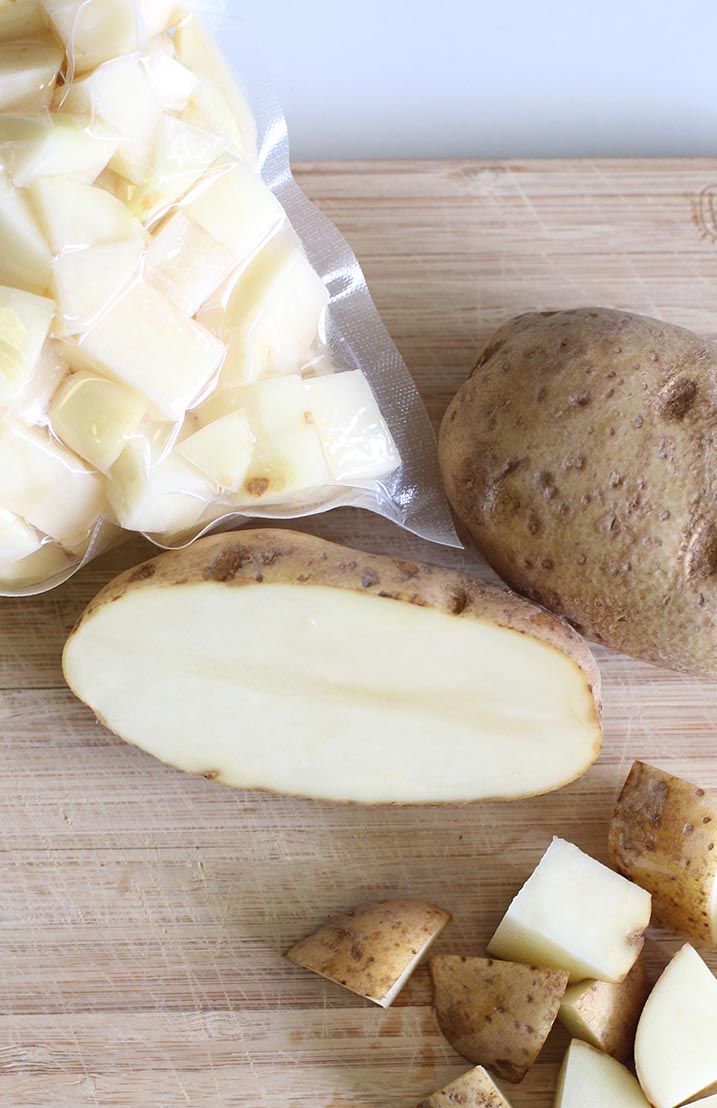Have you ever found yourself with an abundance of potatoes and wondered if you could freeze them whole? You’re not alone.
Many people face the dilemma of preserving their spud stash without sacrificing flavor or texture. Imagine opening your freezer and having ready-to-use potatoes at your fingertips, saving you time and energy on busy days. But can you really freeze whole potatoes without turning them into a mushy mess?
We’ll explore whether freezing whole potatoes is possible, and if so, how to do it properly. Get ready to uncover the secrets of potato preservation that could revolutionize your kitchen routine and keep your meals delicious.

Credit: thefamilyfreezer.com
Table of Contents
Freezing Basics For Potatoes
Different potatoes have different uses. Russet potatoes are great for baking. Yukon Gold potatoes are good for mashing. Choose the right potato for your needs. Red potatoes hold their shape well. They are good for salads. Fingerling potatoes are small and tasty. They are best for roasting. Knowing your potato helps in freezing.
Freezing can change potato texture. Frozen potatoes may become mushy. This happens because of water inside. Ice crystals form and break cells. Blanching potatoes before freezing helps. It keeps texture better. Cooked potatoes freeze better than raw. Keep this in mind when freezing.
Preparation Techniques
Potatoes should be clean. Use water to wash off dirt. A brush can help remove tough spots. Peeling is simple. A peeler or knife works best. Peeling makes potatoes ready for the next step.
Blanching is essential. It keeps potatoes fresh. Boil water in a pot. Add potatoes for 3 minutes. Quickly remove and place in ice water. This stops cooking and locks in color. Pat dry before freezing.
Proper Storage Methods
Picking the right container is key for freezing potatoes. Use airtight containers or strong freezer bags. They keep air and moisture out. This helps the potatoes stay fresh. Make sure the container is clean and dry. A dirty container can spoil the potatoes. Always check that the seal is tight. Loose seals let in air. Air can cause freezer burn. Freezer burn makes potatoes taste bad.
Always label containers before freezing. Write the date and type of potatoes on it. Use a marker that doesn’t wash off. Knowing the date helps you use old potatoes first. Eating them in time is important. It keeps your food fresh and tasty. Store the containers in the freezer’s coldest part. This spot keeps them frozen longer.
:max_bytes(150000):strip_icc()/GettyImages-1174726895-2000-ec4ec8201d3342a68e5a5a87857f1744.jpg)
Credit: www.allrecipes.com
Thawing And Usage Tips
Place frozen potatoes in the fridge overnight. This helps them thaw slowly. Slow thawing keeps them fresh. For faster thawing, use cold water. Put potatoes in a sealed bag. Immerse the bag in cold water. Change the water every 30 minutes. Never use hot water. It can spoil the potatoes.
Thawed potatoes can be baked or fried. They make tasty mashed potatoes too. For baking, preheat the oven to 350°F. Bake for about 20 minutes. For frying, heat oil in a pan. Cook until golden brown. Enjoy with your favorite dip. Mashed potatoes need butter and milk. Mash until smooth. Add salt and pepper to taste.
Expert Advice And Recommendations
Many people freeze whole potatoes without thinking. This leads to poor results. Whole potatoes often turn mushy when thawed. They lose flavor. Freezing potatoes with skin on can be bad. The skin becomes tough. Improper packaging is another mistake. Air exposure causes freezer burn. Potatoes get dry and tasteless. Ignoring blanching is a common error. Blanching helps retain color and taste. Always cool potatoes before freezing. Avoid overcrowding in the freezer. It affects temperature and quality.
Blanch potatoes before freezing. It keeps them fresh. Cool potatoes completely before freezing. Use airtight containers or bags. This keeps potatoes safe from air. Label containers with dates. It helps track freshness. Freeze in small batches. This ensures even freezing. Cut potatoes into smaller pieces. They freeze better. Maintain freezer temperature at zero degrees. It preserves quality. Check potatoes regularly for freezer burn. Avoid refreezing thawed potatoes. It harms taste and texture.
:max_bytes(150000):strip_icc()/potatoes-1244x1244-1-4d3093944064428bb1067b683b8fc0a6.jpg)
Credit: www.eatingwell.com
Conclusion
Freezing whole potatoes is possible but requires care. Start with fresh, firm potatoes. Blanching is crucial for preserving texture and flavor. Always cool and dry potatoes before freezing. Use airtight containers to prevent freezer burn. Label them with dates for easy tracking.
Frozen potatoes are perfect for soups and stews. Not recommended for fries or salads. They may become mushy after thawing. Cooking them straight from the freezer is best. Consider trying this method. It can save time and reduce waste. Enjoy the convenience of having potatoes ready anytime!

I am Brianna, a self-published author with a passion for sharing my knowledge and expertise on various topics with people looking to find the perfect items for their needs. I love ensuring that the right informative content is available to people looking for the right information. I am an avid horseback rider and reader when I am not writing.
Follow me on Facebook, TikTok, or Personal Blog.